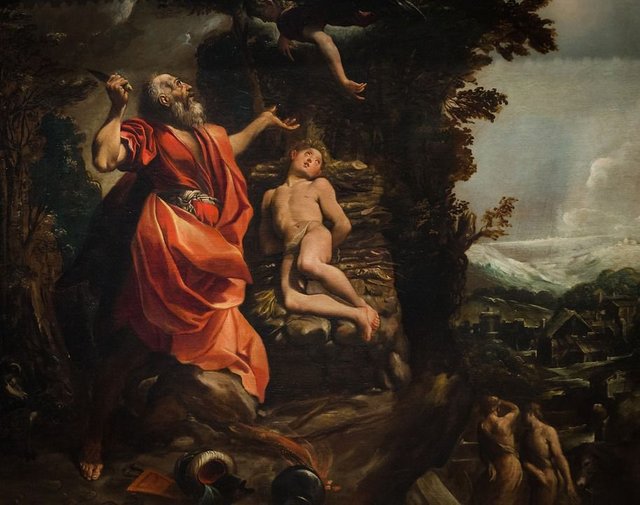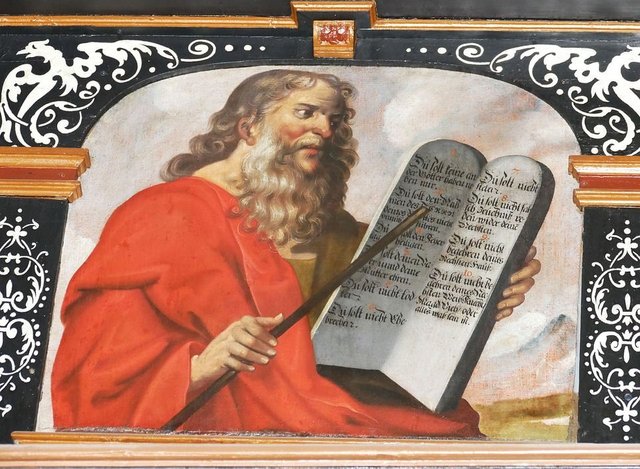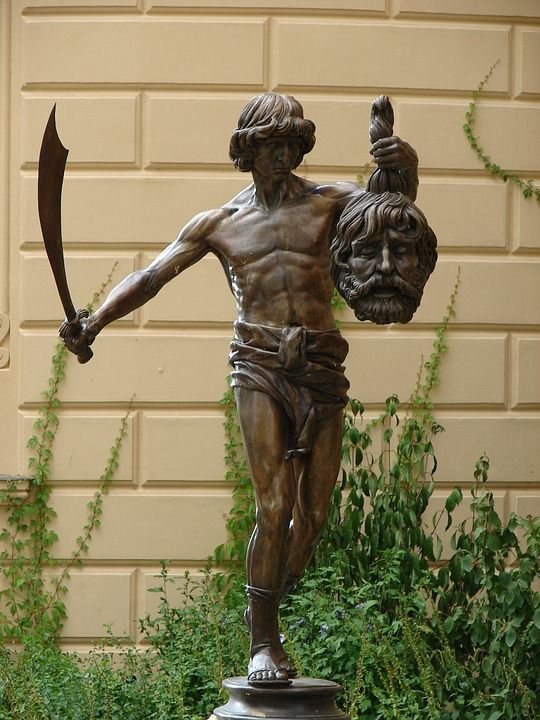The Covenants of the Old Testament
The Covenants of the Old Testament
How covenants in the bible affect legal and moral requirements for mankind
This is the second in a series of posts I'm working of regarding the Law in the Christian Bible. My goal is to encourage thought and discussion, not to "tell you how it is." This is a bible study, and I encourage anyone who reads this or listens to the podcast to join the conversation.
You can see my first post here: https://steemit.com/jesus/@garthfreeman/christianity-the-law-and-the-ten-commandments
What is a Covenant?
First off, I thinks it's important to define the term covenant, and since I don't have any particular authority, I'm going to borrow from Easton's Bible Dictionary. (it's public domain: http://eastonsbibledictionary.org/)
Covenant: a contract or agreement between two parties. In the Old Testament the Hebrew word berith is always thus translated. Berith is derived from a root which means “to cut,” and hence a covenant is a “cutting,” with reference to the cutting or dividing of animals into two parts, and the contracting parties passing between them, in making a covenant (Gen. 15; Jer. 34:18, 19).
I think it's important to point out that it's an agreement between two parties. These days we are held to a legal standard we didn't agree to; they existed before we were born for the most part. In the bible it's not really like that. In the bible, either God promises to do something unconditionally or he enters into an agreement with people.
Not all covenants are made in the same way in the bible, but they have several similar characteristics. I will list three:
Terms of the Covenant: This is like a modern contract where one party agrees to do one thing, and the other agrees to do another.
Sign of the Covenant: This is a demonstration of intent to keep the terms of the covenant. It can be either a physical symbol or an action.
Blessings or curses: This is the answer to: "what happens if I don't?" In the Bible, there's usually blessings for following through, and curses for not following through.
Major Covenants in the Bible
The bible has many covenants in it, some between men and God, some between men and other men. For the purposes of our discussion here, I think there are four main covenants that effect our understanding of the law. Let's take a look at them, in chronological order.

Noahic Covenant: The first covenant we will discuss happens right after the Global flood that wiped out all life on Earth, except the lives inside the ark built by Noah. Here it is from the KJV:
And God blessed Noah and his sons, and said unto them, Be fruitful, and multiply, and replenish the earth. And the fear of you and the dread of you shall be upon every beast of the earth, and upon every fowl of the air, upon all that moveth upon the earth, and upon all the fishes of the sea; into your hand are they delivered.
Every moving thing that liveth shall be meat for you; even as the green herb have I given you all things. But flesh with the life thereof, which is the blood thereof, shall ye not eat.
And surely your blood of your lives will I require; at the hand of every beast will I require it, and at the hand of man; at the hand of every man's brother will I require the life of man.
Whoso sheddeth man's blood, by man shall his blood be shed: for in the image of God made he man. And you, be ye fruitful, and multiply; bring forth abundantly in the earth, and multiply therein.
And God spake unto Noah, and to his sons with him, saying, And I, behold, I establish my covenant with you, and with your seed after you; And with every living creature that is with you, of the fowl, of the cattle, and of every beast of the earth with you; from all that go out of the ark, to every beast of the earth.
And I will establish my covenant with you, neither shall all flesh be cut off any more by the waters of a flood; neither shall there any more be a flood to destroy the earth.
And God said, This is the token of the covenant which I make between me and you and every living creature that is with you, for perpetual generations:
I do set my bow in the cloud, and it shall be for a token of a covenant between me and the earth.
And it shall come to pass, when I bring a cloud over the earth, that the bow shall be seen in the cloud: And I will remember my covenant, which is between me and you and every living creature of all flesh; and the waters shall no more become a flood to destroy all flesh.
And the bow shall be in the cloud; and I will look upon it, that I may remember the everlasting covenant between God and every living creature of all flesh that is upon the earth.
And God said unto Noah, This is the token of the covenant, which I have established between me and all flesh that is upon the earth.
Here, we see the components listed above:
| Terms | Sign | Blessings and curses |
|---|---|---|
| God promises not to wipe out all life on Earth ever again. He tells man not to kill one another and authorizes meat eating. | The sign of the covenant is the Rainbow, which appears everywhere on earth when conditions are right. | The blessing is that God will never again destroy humanity, though we might deserve it. The curse is that if Man kills man, by man shall his blood be shed. |
In the Bible, all the Earth was repopulated by Noah and his family, so this covenant is applicable to all humanity. This covenant, as I understand it, is one of the times God just promises something and doesn't require input from the other party. Really, though, what was Noah going to say? He was hardly in a position to argue considering what he had just lived through.

Abrahamic Covenant: This one can be understood to be multiple different covenants, or as a single covenant that was recorded and or revealed in segments. I lean towards the latter understanding, but it really makes little difference to our current discussion, except that I'm going to have to use more bible quotations to get it all in here.
The first part of the covenant is in Genesis 12:1-3
Now the Lord had said unto Abram, Get thee out of thy country, and from thy kindred, and from thy father's house, unto a land that I will shew thee:
And I will make of thee a great nation, and I will bless thee, and make thy name great; and thou shalt be a blessing:
And I will bless them that bless thee, and curse him that curseth thee: and in thee shall all families of the earth be blessed.
The actual covenant ceremony is recorded in Genesis chapter 15.
After these things the word of the Lord came unto Abram in a vision, saying, Fear not, Abram: I am thy shield, and thy exceeding great reward.
And Abram said, Lord God, what wilt thou give me, seeing I go childless, and the steward of my house is this Eliezer of Damascus?
And Abram said, Behold, to me thou hast given no seed: and, lo, one born in my house is mine heir.
And, behold, the word of the Lord came unto him, saying, This shall not be thine heir; but he that shall come forth out of thine own bowels shall be thine heir.
And he brought him forth abroad, and said, Look now toward heaven, and tell the stars, if thou be able to number them: and he said unto him, So shall thy seed be.
And he believed in the Lord; and he counted it to him for righteousness.
And he said unto him, I am the Lord that brought thee out of Ur of the Chaldees, to give thee this land to inherit it.
And he said, Lord God, whereby shall I know that I shall inherit it?
And he said unto him, Take me an heifer of three years old, and a she goat of three years old, and a ram of three years old, and a turtledove, and a young pigeon.
And he took unto him all these, and divided them in the midst, and laid each piece one against another: but the birds divided he not.
And when the fowls came down upon the carcases, Abram drove them away.
And when the sun was going down, a deep sleep fell upon Abram; and, lo, an horror of great darkness fell upon him.
And he said unto Abram, Know of a surety that thy seed shall be a stranger in a land that is not theirs, and shall serve them; and they shall afflict them four hundred years;
And also that nation, whom they shall serve, will I judge: and afterward shall they come out with great substance.
And thou shalt go to thy fathers in peace; thou shalt be buried in a good old age.
But in the fourth generation they shall come hither again: for the iniquity of the Amorites is not yet full.
And it came to pass, that, when the sun went down, and it was dark, behold a smoking furnace, and a burning lamp that passed between those pieces.
In the same day the Lord made a covenant with Abram, saying, Unto thy seed have I given this land, from the river of Egypt unto the great river, the river Euphrates:
The Kenites, and the Kenizzites, and the Kadmonites,
And the Hittites, and the Perizzites, and the Rephaims,
And the Amorites, and the Canaanites, and the Girgashites, and the Jebusites.
This is another covenant whereby God promises to do something and doesn't require anything from the other party. It's sometimes called unconditional. This is emphasized in that Abram was unable to walk between the divided animals and God alone passed between them in the form of a burning lamp.
The last part of the covenant I'd like to point out is recorded in Genesis chapter 17. For the sake of keeping the post from getting too long in the tooth, I'm limiting the quote. Please check out the entire chapter when you get a chance, it's important. For now, the sign of the covenant is given to Abram/Abraham in vs 10 and 11:
This is my covenant, which ye shall keep, between me and you and thy seed after thee; Every man child among you shall be circumcised.
And ye shall circumcise the flesh of your foreskin; and it shall be a token of the covenant betwixt me and you.
So again we have:
| Terms | Sign | Blessings and Curses |
|---|---|---|
| God promises to bless Abram with many descendants. He promises Abrams descendants the land of Canaan, and He promises that through Abram all the families of the world will be blessed. | The sign of the covenant is Circumcision. Abram was to teach his children to continue on in the practice of circumcision perpetually. | God promises to bless Abram, his offspring, and the rest of Humanity. He also promises that He will bless those who bless Abram, and curse those who curs Abram. |

Mosaic Covenant - This covenant is probably the most complex, but don't worry, I'll be as brief as possible. I intend to revisit each one in separate posts. For now, I'm going to do a little verse clipping, but everything I'm using today is from Exodus. This one isn't unconditional, and the Bible takes its time setting it up.
First, in Exodus 19 we see God setting the stage, and the Israelite people agreeing to enter into the covenant. Ex 19:4-8
Ye have seen what I did unto the Egyptians, and how I bare you on eagles' wings, and brought you unto myself.
Now therefore, if ye will obey my voice indeed, and keep my covenant, then ye shall be a peculiar treasure unto me above all people: for all the earth is mine:
And ye shall be unto me a kingdom of priests, and an holy nation. These are the words which thou shalt speak unto the children of Israel.
And Moses came and called for the elders of the people, and laid before their faces all these words which the Lord commanded him.
And all the people answered together, and said, All that the Lord hath spoken we will do. And Moses returned the words of the people unto the LordHere we see both parties agreeing to enter into contract. God wants to make sure the people take it seriously so he sets the stage rather dramatically. (Read the rest of ch. 19 to see more.)
Next, in chapter 20 God gives the terms of the covenant, the Ten Commandments. I'm not going to cite that here, since most people are familiar with them, but to demonstrate the Ten were the terms of the covenant, lets look at Exodus 34: 27-28:
And the Lord said unto Moses, Write thou these words: for after the tenor of these words I have made a covenant with thee and with Israel.
And he was there with the Lord forty days and forty nights; he did neither eat bread, nor drink water. And he wrote upon the tables the words of the covenant, the ten commandments.
Now, for the sign we turn to chapter 31, verse 13:
Speak thou also unto the children of Israel, saying, Verily my sabbaths ye shall keep: for it is a sign between me and you throughout your generations; that ye may know that I am the Lord that doth sanctify you.
The blessings and curses are listed in Deuteronomy, chapter 28, which I will summarize but encourage you to check out. Basically, If the Israelite people would obey God he would make them a prosperous nation which would be a blessing to all the world. If they didn't obey, God promises to deal very harshly with them.
Our three covenant components:
| Terms | Sign | Blessings and Curses |
|---|---|---|
| God, as Sovereign, promises to bless the people in various ways if they obey his commands. They will be a kingdom of priests for the rest of the world. In return, the people promise to do all that He has commanded. God's status as Sovereign gives him the right to define how the people should behave, and He gives them the Ten Commandments. The rest of the laws He gives them are derived from His authority over them as God. | The sign of the Covenant is observing the Sabbath | God promises to protect them, preserve them, give them land, and make them a great nation: a kingdom of priests, if they obey. If they don't obey, He promises to punish them by removing His protection and allowing their enemies to overrun them. |

Davidic Covenant: The last covenant I'll discuss is the one God enters into with David. It is another unconditional covenant. Let's take a look, in 2 Samual 7:8-16:
Now therefore so shalt thou say unto my servant David, Thus saith the Lord of hosts, I took thee from the sheepcote, from following the sheep, to be ruler over my people, over Israel:
And I was with thee whithersoever thou wentest, and have cut off all thine enemies out of thy sight, and have made thee a great name, like unto the name of the great men that are in the earth.
Moreover I will appoint a place for my people Israel, and will plant them, that they may dwell in a place of their own, and move no more; neither shall the children of wickedness afflict them any more, as beforetime,
And as since the time that I commanded judges to be over my people Israel, and have caused thee to rest from all thine enemies. Also the Lord telleth thee that he will make thee an house.
And when thy days be fulfilled, and thou shalt sleep with thy fathers, I will set up thy seed after thee, which shall proceed out of thy bowels, and I will establish his kingdom.
He shall build an house for my name, and I will stablish the throne of his kingdom for ever.
I will be his father, and he shall be my son. If he commit iniquity, I will chasten him with the rod of men, and with the stripes of the children of men:
But my mercy shall not depart away from him, as I took it from Saul, whom I put away before thee.
And thine house and thy kingdom shall be established for ever before thee: thy throne shall be established for ever.
Here we have all three elements of the covenant in one text. This covenant, however, ins unique in that it lists only blessings, and the sign isn't specifically mentioned. It's another unconditional covenant as well.
| Terms | Sign | Blessings and Curses |
|---|---|---|
| God promises to make David and his progeny a great dynasty. He promises to forgive their iniquities, albeit not without discipline. Further, God promises David that one of his descendants will establish a never ending kingdom. | To be sure there is a lot of room for discussion on this one, but it is my understanding that the sign of the covenant is the life of the descendants themselves. God doesn't let the line die out, even when it looks like it might. | God promises to protect the people and continue to ensure the Davidic line is the ruling line over the people of Israel |
I know this is a pretty lengthy post, but believe me, it's pretty summarized. The concepts here can be understood in various ways, but they are essential to understanding the message of the Bible.
If this topis interests you, stick around. The next segment is going to be a dissection of each covenant, and a discussion of how jesus fulfilled them. Remember, He said:
Think not that I am come to destroy the law, or the prophets: I am not come to destroy, but to fulfil.
For verily I say unto you, Till heaven and earth pass, one jot or one tittle shall in no wise pass from the law, till all be fulfilled. (Matther 5:17-18)
Thanks for following along. Please join the conversation by commenting, liking, sharing, and/or following.
https://steemit.com/@garthfreeman

This post has been ranked within the top 80 most undervalued posts in the second half of Jan 31. We estimate that this post is undervalued by $5.99 as compared to a scenario in which every voter had an equal say.
See the full rankings and details in The Daily Tribune: Jan 31 - Part II. You can also read about some of our methodology, data analysis and technical details in our initial post.
If you are the author and would prefer not to receive these comments, simply reply "Stop" to this comment.
Excellent job! But you missed one of the most critical of the covenants...the Levitical.
Thanks! I don't know if I missed it, more like I view it as part of the Mosaic. I intend to address it at some point, linking priestly roles and Jesus' role as described in Hebrews, but frankly I'm intimidated by it. I though I'd start small:)
It also contains the collection of tithes as decreed by King Melchizedek.
Yeah, there's a lot there. I could spend years studying Hebrews but I don't think I'm up to teaching it all. I'll probably do smaller chunks, a little at a time. I'm no biblical scholar, just a guy trying to raise the average Christian's understanding of scripture.
My original plan was to explain the covenants, then the sacrificial system, then maybe a breakdown of Heb ch's 8-10, explaining how Jesus fulfilled the Mosaic covenant and the implications of His fulfillment of the Day of Atonement.
I surely haven't got it all figured out yet, but I think a lot of people who read the bible skip the Pentateuch from the second half of Exodus on. Then, when they get to Hebrews all kinds of wild interpretations come out. I started this whole thing as a way to parse/study out the laws in the OT and their applicability for us today.
Thanks for your feedback, and I'm open to suggestions on how to proceed. Prayers are welcome, too!
My prayers, you have. I'm no Biblical scholar either so any advice I'll have to think about and pray on.
Thanks for sharing, Garth!
You're welcome! Thanks for reading.